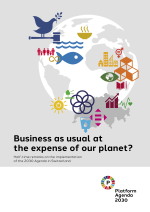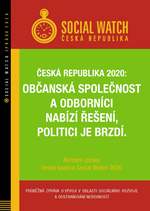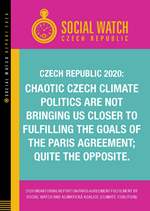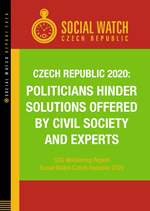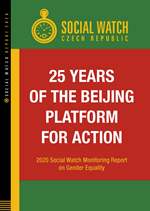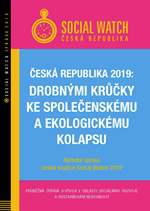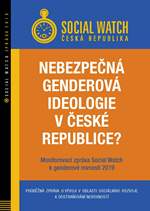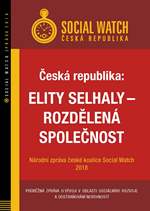Watcher's publications
Published on Wed, 2022-08-03 18:55
The covid-19 pandemic has increased poverty and inequality in the country and has laid bare the weaknesses of the public health and social protection systems, educational systems as well as provision of livelihoods and employment to Filipinos. This has led to catastrophic consequences for workers and their families, the majority of whom are in the informal sector and many of whom are women. Yet, two years since the onset of the Covid-19 pandemic, there has been no fundamental change in the government’s developmental strategy to address these systemic weaknesses and prioritize the care programs and services that our people need. Emerging from what seems to be the worst period of the Covid-19 pandemic, the country is slowly returning to some semblance of ‘normalcy’ (or what is also referred to as ‘the new normal’). |
Published on Fri, 2022-07-29 17:01
This year's report of the Social Watch for the Czech Republic focuses on three areas: the economy, health and care and socio-economic transformation. The report responds to the ramifications of the Covid-19 pandemic, but it also reflects on issues related to the conflict in Ukraine, in particular the impact of rising energy prices and inflation. In the report, economist Ilona Švihlíková criticises the absence of national economic policy and chaotic conduct of the governments (there was a change in administrations after last year’s October elections) throughout the pandemic, as well as its unsystematic and antisocial tax policy. |
Published on Thu, 2022-07-28 17:53
Switzerland is not on course for a sustainable world. That’s the verdict from Platform Agenda 2030 in its new report “Business as usual at the expense of our planet? Half-time remarks on the implementation of the 2030 Agenda in Switzerland”. It is calling upon the Federal Council to show more leadership in the transformation needed to halve poverty, protect the climate and human rights, and hold the financial sector to account. |
Published on Tue, 2020-11-03 00:00
Social Watch Czech Republic releases an annual report evaluating the progress of the Czech Republic towards reaching the UN Sustainable Development Goals. The report is divided into five sections: people, planet, prosperity, peace, and partnership. The Czech Republic is failing to meet many of the UN sustainable development targets, with progress only visible in certain areas, according to a report last week from Social Watch CZ, a non-governmental organization that monitors compliance with the goals. |
Published on Wed, 2020-09-30 00:00
Our current civilization could have emerged only thanks to suitable climatic conditions which arose with the end of the last ice age about 10 000 years ago. A stable and favourable climate enabled people to settle, build settlements, engage in agriculture, and develop technically and culturally. Approximately 200 years ago, the discovery that it was possible to obtain energy through burning fossil fuels led to an industrial revolution, to a further acceleration of technical progress, and to a huge increase in the world’s population as well. |
Published on Tue, 2020-07-21 00:00
Five years ago, as part of the United Nations Summit on Sustainable Development, all UN member states ratified the Sustainable Development Goals. In 2017, the government of the Czech Republic ratified the strategic document “Czech Republic 2030” whose goal was to improve the quality of life across all the regions and to put Czechia on a path to development which would be sustainable in its social, economic and environmental impacts. |
Published on Thu, 2020-06-18 00:00
This year marks the 25th anniversary of the Fourth World Conference on Women held in 1995 where the Beijing Declaration and Platform for Action were first adopted embodying the goals and recommended actions for improving women‘s access to their rights in 12 key areas. The presented monitoring report of the Czech Social Watch Coalition on Gender Equality focuses in four studies on the following areas of the Beijing Platform for Action: women and poverty, violence against women, women and economic inequality, and women in decision-making positions. |
| Published on Wed, 2019-09-18 00:00 |
| Published on Wed, 2019-07-03 00:00 |
SUSCRIBE TO OUR NEWSLETTER



